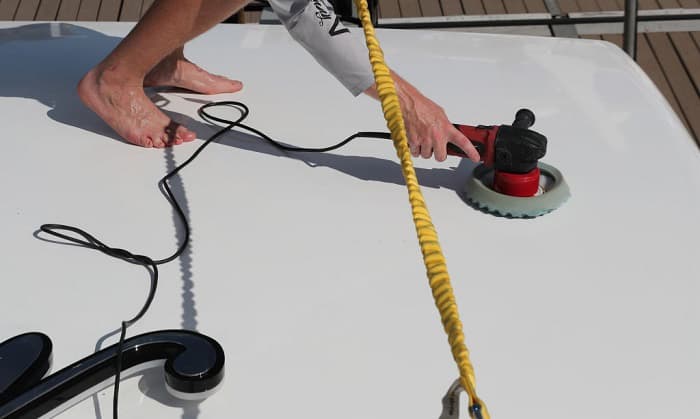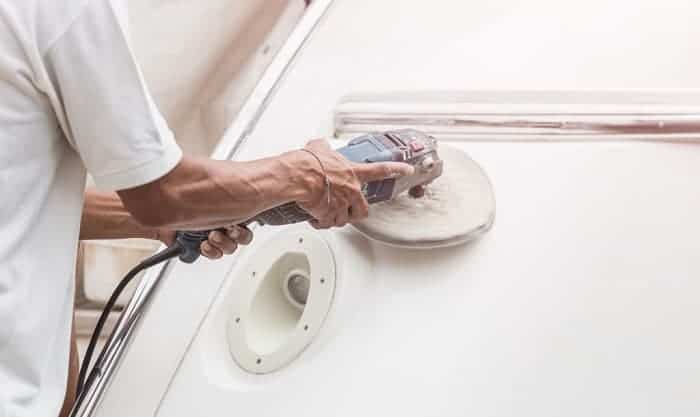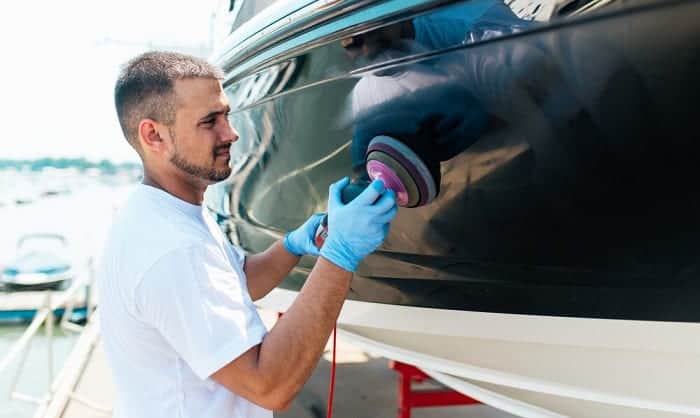It’s undeniable that sailing with your boat is relaxing. To get this benefit any time you want, you have to look after your boat’s condition. One way of doing it is learning how to wax a boat with a buffer.
Fiberglass is common nowadays due to its durability. Despite its strength, you have to wash, buff, wax, and buff your boat for the second time. These steps assure you to completely get rid of dirt, grease, and unwanted things on the hull.
Make sure that you have efficient tools and cleaners to maintain your boat’s optimum performance. All of them are disclosed in the article.
Table of Contents
Importance of Waxing a Boat
Wax application is important for your boat as it’s part of the maintenance regimen. Whenever you sail with it, exposure to water and the sun is inevitable. With continuous encounters, it takes a toll on your boat as corrosion can be seen on some parts.
Without regular waxing, your boat will be easily degraded by damage and dullness. It’s one of the crucial things you need to do if you wish your boat to last for a long time. Ideally, waxing should be done every three or four months. You can retain its fine appearance for the years to come.
What to Look For on a Buffer?
Some may be intimidated to use a buffer, but the procedure will be a lot easier than doing it by hand if you get the right one. The result would be more amazing too. You have to check the following features to ensure that you don’t mess up with your boat’s gel coat.
Orbital Operation
You may find traditional polisher spin work at a high rate on a single axis. Leave it for too long and you’ll end up burning the gelcoat. A good buffer doesn’t only concentrate in a single spot as you move it in a circular motion.
A 6-inch head is a size that a non-pro can handle. Thus, be picky with the size too.
Variable Speed
There are different tasks for a buffer to handle. In regards to this matter, there are various speed settings or RPM. I have a buffer with six settings.
Based on my experience, 2,500 OPM (oscillations per minute) is fine with buffing and waxing. It’s 3,900 OPM for cleaning and polishing. When it comes to removing oxidation or paint defects, 6,500 OPM is what you need.
Guide on Waxing a Boat with a Buffer
1. Washing the Boat
Before waxing a boat, you have to wash it first. Hence, you need to pick a dependable cleaner to eliminate dirt, debris, and other unwanted presence. You can choose from good cleaners like Star Brite Instant Hull Cleaner, Boat Juice, and 303 Multi-surface Cleaner.
Wash your boat thoroughly to get rid of any build-up from staying too long in the water. Dirt doesn’t only ruin the appearance of your boat, but it causes damage too. That’s why maintenance is essential.
Your boat should be removed from the water before washing. It’s best to let it sit on a bunk trailer or roller trailer, which should be lying flat on the ground. This is important so your boat won’t tip over while being washed.
You should also prepare a cover for the boat interior to prevent it from getting wet as water and a cleaning solution might get into it. A hose can help you wash down the dirt and the suds as well.
With stubborn stains or grime, a damp cloth or sponge is needed to focus on to successfully get rid of it. If ever there are some parts with damaged wax, a dewaxing solution or toluene to fix it.
When your boat is free from any dirt, you can do the final rinse. Then, let the boat dry.
2. Buffing the Boat’s Surface
After a thorough cleaning, you need to apply a polishing compound when buffing a boat because of its scratches and some imperfections on its surface. Expect a slight abrasiveness from the polish as it’s formulated to disintegrate discoloration and flaws.
A stronger compound is necessary if there’s severe discoloration. It doesn’t matter what brand of buffing compound or boat polish you use because they’re all applied in the same way. With a 3M polishing solution, you can choose from light, medium, and heavy. Hence, you can find one that suits the project that you need to accomplish.
Gently apply the substance in small sections at a time. Doing it manually is fine with a soft cloth, but you can make it more convenient with a buffer. This device has a polishing pad to finish the application.
You may consider buying a set composed of a polishing compound, buffer, polishing pads, and other essential items. Polishing should go through circular motion within the same direction as you go along the entire surface of the boat.
Don’t overdo the process as you use an abrasive substance. Be consistent in applying the substance gently and slowly. You can stop working once the surface is shiny and glassy. If you wish to make it shinier, repeat this process.
3. Wax Application
At this point, you should know the best way to wax a boat. Choose the wax that is good for the material of your boat. Manufacturers provide a manual or some recommendations.
There are great options such as Meguiar Flagship Premium Marine Wax, Boat Bling High-Gloss Fast Wax, Star Brite Restorer Wax, and 3M Restorer and Wax. Before applying the wax that you’ve chosen, know the proper ways from reading its instructions.
It must be done in a circular motion. Again, using your hand is fine but buffers for boats will make it easier for you. Do it in small sections like what you did when polishing. You need to give wax some time until it gets hazy for the final step.
4. Buffing the Wax
Again, buffing is required after wax application. Even though you’ll do it manually, the circular application method of application is a must as you go all over the boat. When you buff the wax, you’ll notice that the surface becomes clean and shinier.
Going through several steps will give you satisfaction as you see the result of your work. All the effort is rewarding as the boat looks brand new!
Things to Avoid When Buffing a Boat
Learning how to buff a boat includes knowledge of some things that you shouldn’t do.
- Never stop or start buffing if the pads are not firmly pushed on the surface. You have to be careful as polishing products or wax will shoot from different directions.
- Use the right amount of the solution. When the application is too thick, the pad can’t do its job well because it will only skid across the gel coat surface like a hydroplaning car.
- Soft, clear plastics are not recommended for application on clear enclosures.
- Avoid scraping the PVC rub rail since leaving marks is not desirable for every boat owner. It’s necessary to tape off the edges.
- It’s not good to press hard on decals or special lettering like gold leaf. Work gently and lightly on them to avoid damages.
- You don’t have to throw pads after use. They can be reused after you clean them in the washing machine. When they’re worn out, you can buy new ones for replacement.
Wax Your Boat with a Buffer Properly
After you’ve learned how to wax a boat with a buffer from this article, you can start collecting the things that you need. First and foremost, get a buffer that you can handle well and serve you efficiently.
It’s also crucial to pick the right cleaner, polishing product, and wax. These things have a big part in the result of your work. So this is the end of this article, did you find this one helpful? Share your thoughts in the comments section and this article with anyone.

“My intention from the first day establishing Boating Basics Online is to provide as much help as possible for boaters who want to experience a first safe and convenient trip. So feel free to join us and share your beautiful journeys to the sea!”



